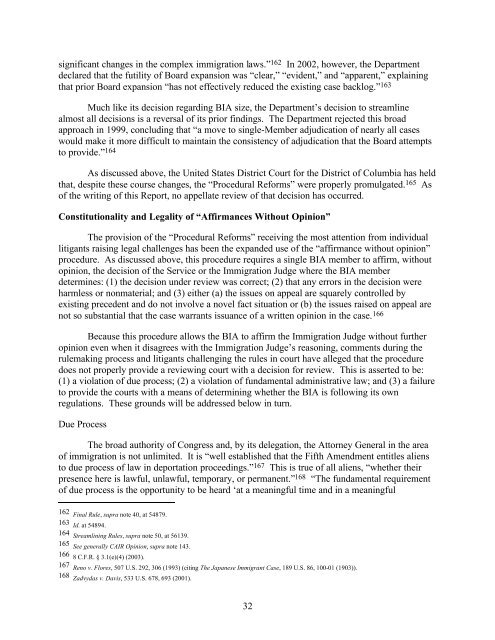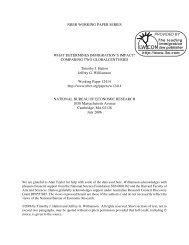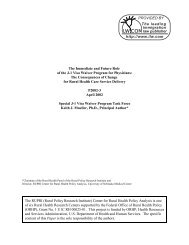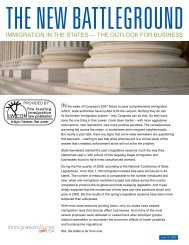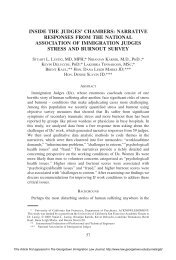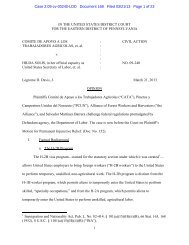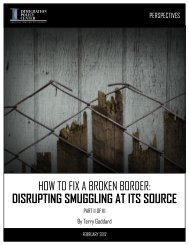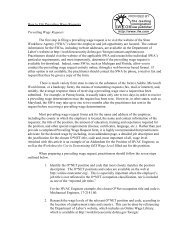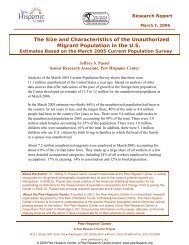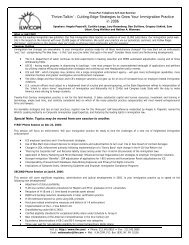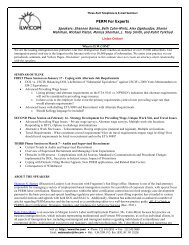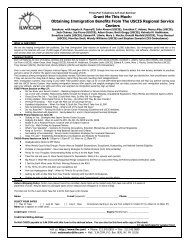Study of Board of Immigration Appeals Procedural Reforms - ILW.com
Study of Board of Immigration Appeals Procedural Reforms - ILW.com
Study of Board of Immigration Appeals Procedural Reforms - ILW.com
Create successful ePaper yourself
Turn your PDF publications into a flip-book with our unique Google optimized e-Paper software.
significant changes in the <strong>com</strong>plex immigration laws.” 162 In 2002, however, the Department<br />
declared that the futility <strong>of</strong> <strong>Board</strong> expansion was “clear,” “evident,” and “apparent,” explaining<br />
that prior <strong>Board</strong> expansion “has not effectively reduced the existing case backlog.” 163<br />
Much like its decision regarding BIA size, the Department’s decision to streamline<br />
almost all decisions is a reversal <strong>of</strong> its prior findings. The Department rejected this broad<br />
approach in 1999, concluding that “a move to single-Member adjudication <strong>of</strong> nearly all cases<br />
would make it more difficult to maintain the consistency <strong>of</strong> adjudication that the <strong>Board</strong> attempts<br />
to provide.” 164<br />
As discussed above, the United States District Court for the District <strong>of</strong> Columbia has held<br />
that, despite these course changes, the “<strong>Procedural</strong> <strong>Reforms</strong>” were properly promulgated. 165 As<br />
<strong>of</strong> the writing <strong>of</strong> this Report, no appellate review <strong>of</strong> that decision has occurred.<br />
Constitutionality and Legality <strong>of</strong> “Affirmances Without Opinion”<br />
The provision <strong>of</strong> the “<strong>Procedural</strong> <strong>Reforms</strong>” receiving the most attention from individual<br />
litigants raising legal challenges has been the expanded use <strong>of</strong> the “affirmance without opinion”<br />
procedure. As discussed above, this procedure requires a single BIA member to affirm, without<br />
opinion, the decision <strong>of</strong> the Service or the <strong>Immigration</strong> Judge where the BIA member<br />
determines: (1) the decision under review was correct; (2) that any errors in the decision were<br />
harmless or nonmaterial; and (3) either (a) the issues on appeal are squarely controlled by<br />
existing precedent and do not involve a novel fact situation or (b) the issues raised on appeal are<br />
not so substantial that the case warrants issuance <strong>of</strong> a written opinion in the case. 166<br />
Because this procedure allows the BIA to affirm the <strong>Immigration</strong> Judge without further<br />
opinion even when it disagrees with the <strong>Immigration</strong> Judge’s reasoning, <strong>com</strong>ments during the<br />
rulemaking process and litigants challenging the rules in court have alleged that the procedure<br />
does not properly provide a reviewing court with a decision for review. This is asserted to be:<br />
(1) a violation <strong>of</strong> due process; (2) a violation <strong>of</strong> fundamental administrative law; and (3) a failure<br />
to provide the courts with a means <strong>of</strong> determining whether the BIA is following its own<br />
regulations. These grounds will be addressed below in turn.<br />
Due Process<br />
The broad authority <strong>of</strong> Congress and, by its delegation, the Attorney General in the area<br />
<strong>of</strong> immigration is not unlimited. It is “well established that the Fifth Amendment entitles aliens<br />
to due process <strong>of</strong> law in deportation proceedings.” 167 This is true <strong>of</strong> all aliens, “whether their<br />
presence here is lawful, unlawful, temporary, or permanent.” 168 “The fundamental requirement<br />
<strong>of</strong> due process is the opportunity to be heard ‘at a meaningful time and in a meaningful<br />
162 Final Rule, supra note 40, at 54879.<br />
163 Id. at 54894.<br />
164 Streamlining Rules, supra note 50, at 56139.<br />
165 See generally CAIR Opinion, supra note 143.<br />
166 8 C.F.R. § 3.1(e)(4) (2003).<br />
167 Reno v. Flores, 507 U.S. 292, 306 (1993) (citing The Japanese Immigrant Case, 189 U.S. 86, 100-01 (1903)).<br />
168 Zadvydas v. Davis, 533 U.S. 678, 693 (2001).<br />
32


